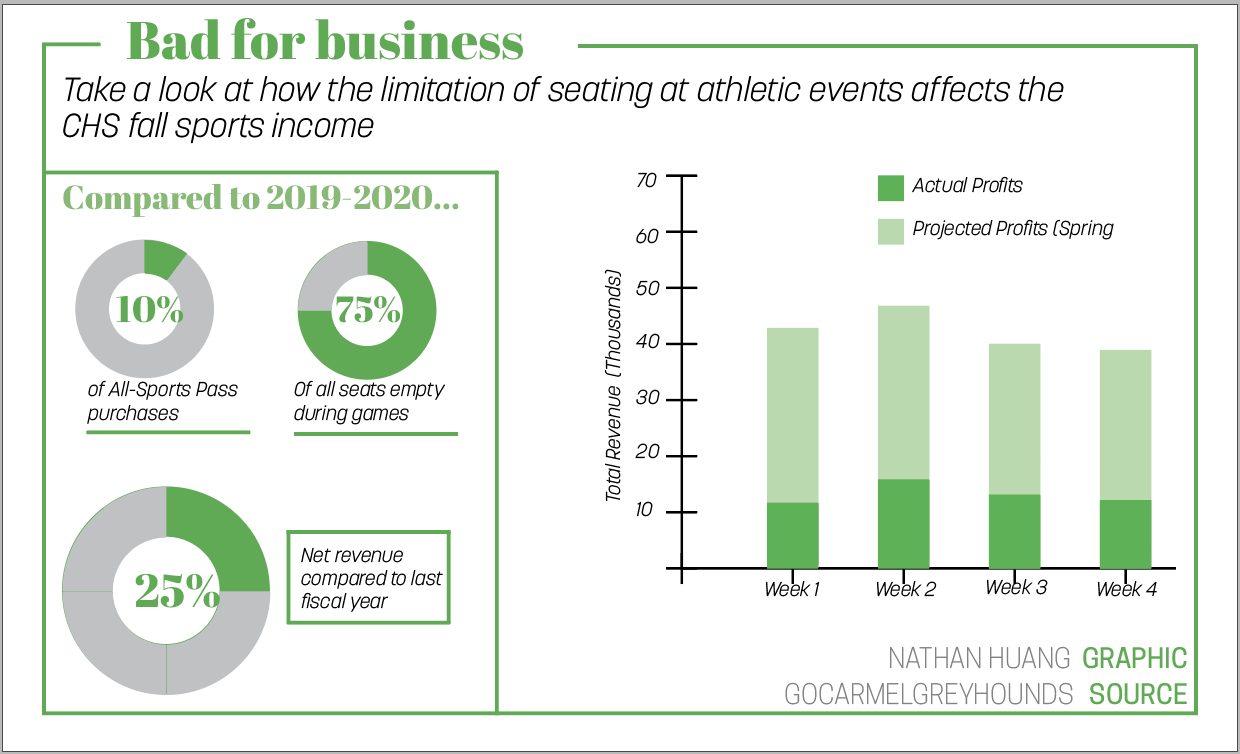This year, because of COVID-19 restrictions, tickets to sporting events have been in short supply. Schools, including CHS, have limited the supply of tickets to regulate social distancing and to keep spectators a safe six feet apart. But, with the stadium operating at 25% capacity, the revenue made from games is potentially 75% less than it has been in past years.
As fewer tickets get purchased, according to Athletics Director Jim Inskeep, the loss of revenue has caused a significant impact on the athletic department’s budget.
Inskeep said, “Attendance at (football) games drives our budget. We are easily about, I estimate, about $50,000 less than where we would typically be at this point because people are just in a wait-and-see mode. Also, we make a significant amount of income each year to assist with the rest of the year from all sports passes, but we’ve sold very few of those this year, so that’s hurting (the athletics department) as well.”
To begin to offset the decreased budget this year, the athletics department took several measures to reduce spending and increase revenue, including raising the price of football game tickets from $6 to $9, with a $1 processing fee.
Inskeep said, “So back about Aug. 10, we set a spending freeze for all of our programs up to this point, unless it was for safety type equipment. With this, we’ve been pretty selective in terms of what our purchases have been to this point. Also, raising the price of tickets is going to help a little bit, but it doesn’t make up for all of what we are losing, keeping in mind that we lost one of our home games as well because we (didn’t play) the Trinity game on Aug. 21.”
According to Joshua Shelton, head coach for the men’s gold team and social studies teacher, the long-term effect of the decreased athletics department budget is unclear.
Shelton said, “While golf is pretty self-sufficient, the participation side of the (golf team) is funded by the athletics department, with stuff such as tournaments covered by that. I’m not sure how (the amount of tournaments) will be affected. I don’t foresee (the golf team) competing less because I haven’t been told that, that will be the case. But I feel like that is possible.”
According to Katerina Folkin, cross-country runner and junior, golf and football aren’t alone in changes to spectators and the effects that come with that.
Folkin said via email, “Meets with no spectators feel a lot different because you don’t have people cheering you on, rooting for you, so you have to make sure that during your race, you’re staying focused and motivating yourself.”
According to Inskeep, despite there being a spectator limit at sporting events, participation of student athletes hasn’t wavered.
Inskeep said, “Participation levels have been right at where they’ve always been. So, we’ve not seen a decrease in the number of student athletes participating and speaking with several of our colleagues around Marion County and Hamilton County, they have seen the same thing, if not a little uptick so far at this point. ”
According to Folkin, despite the unclear long-term effect of the decreased budget for the athletics department and the cross-country team in turn, she is grateful she gets any form of a season.
Folkin said, “I’m pretty sad that we don’t have as many meets and our season is being shortened. But, these changes have been made for us to stay safe, so if that means shortening the season, that is better than no season at all.”

































![AI in films like "The Brutalist" is convenient, but shouldn’t take priority [opinion]](https://hilite.org/wp-content/uploads/2025/02/catherine-cover-1200x471.jpg)









































![Review: “The Immortal Soul Salvage Yard:” A criminally underrated poetry collection [MUSE]](https://hilite.org/wp-content/uploads/2025/03/71cju6TvqmL._AC_UF10001000_QL80_.jpg)
![Review: "Dog Man" is Unapologetically Chaotic [MUSE]](https://hilite.org/wp-content/uploads/2025/03/dogman-1200x700.jpg)
![Review: "Ne Zha 2": The WeChat family reunion I didn’t know I needed [MUSE]](https://hilite.org/wp-content/uploads/2025/03/unnamed-4.png)
![Review in Print: Maripaz Villar brings a delightfully unique style to the world of WEBTOON [MUSE]](https://hilite.org/wp-content/uploads/2023/12/maripazcover-1200x960.jpg)
![Review: “The Sword of Kaigen” is a masterpiece [MUSE]](https://hilite.org/wp-content/uploads/2023/11/Screenshot-2023-11-26-201051.png)
![Review: Gateron Oil Kings, great linear switches, okay price [MUSE]](https://hilite.org/wp-content/uploads/2023/11/Screenshot-2023-11-26-200553.png)
![Review: “A Haunting in Venice” is a significant improvement from other Agatha Christie adaptations [MUSE]](https://hilite.org/wp-content/uploads/2023/11/e7ee2938a6d422669771bce6d8088521.jpg)
![Review: A Thanksgiving story from elementary school, still just as interesting [MUSE]](https://hilite.org/wp-content/uploads/2023/11/Screenshot-2023-11-26-195514-987x1200.png)
![Review: "When I Fly Towards You", cute, uplifting youth drama [MUSE]](https://hilite.org/wp-content/uploads/2023/09/When-I-Fly-Towards-You-Chinese-drama.png)
![Postcards from Muse: Hawaii Travel Diary [MUSE]](https://hilite.org/wp-content/uploads/2023/09/My-project-1-1200x1200.jpg)
![Review: "Ladybug & Cat Noir: The Movie," departure from original show [MUSE]](https://hilite.org/wp-content/uploads/2023/09/Ladybug__Cat_Noir_-_The_Movie_poster.jpg)
![Review in Print: "Hidden Love" is the cute, uplifting drama everyone needs [MUSE]](https://hilite.org/wp-content/uploads/2023/09/hiddenlovecover-e1693597208225-1030x1200.png)
![Review in Print: "Heartstopper" is the heartwarming queer romance we all need [MUSE]](https://hilite.org/wp-content/uploads/2023/08/museheartstoppercover-1200x654.png)



